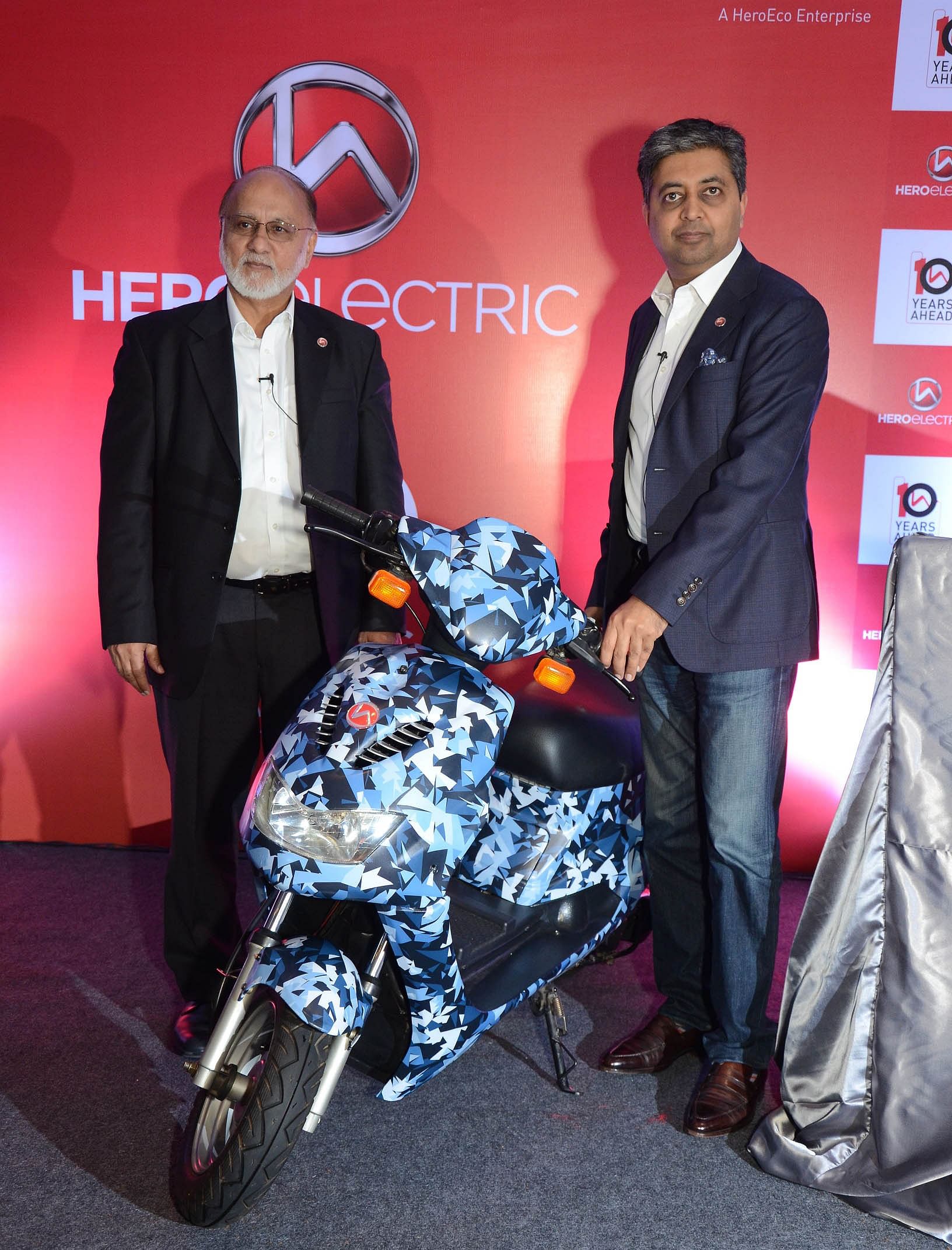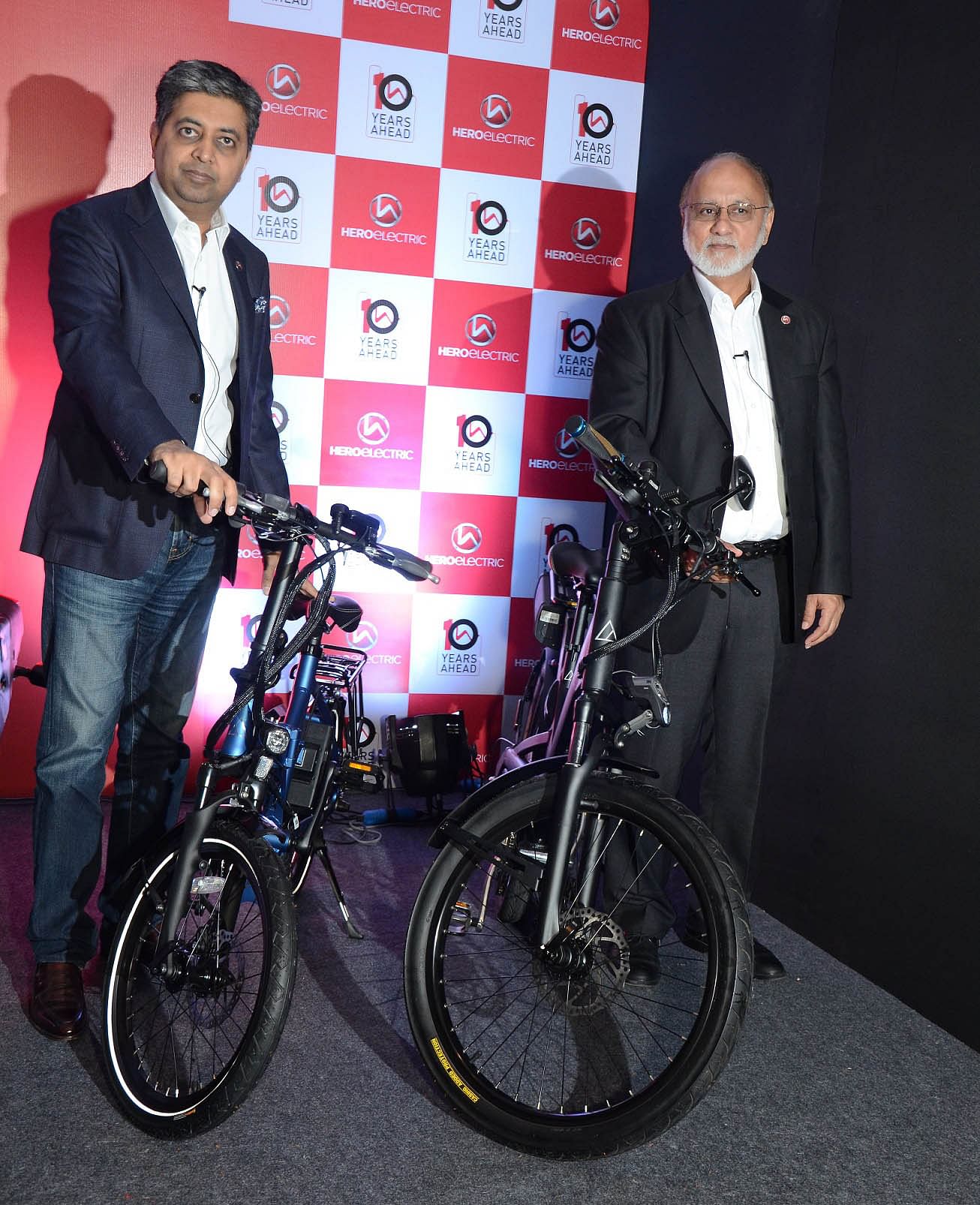Hero Electric unveils high power e-scooter, to set up new plant in South India by November
Major player in the electric two-wheeler space with a market share of over 65 percent unveils three new products comprising an e-scooter and two e-bikes for the Indian market.
Hero Electric today took the curtains off its AXLHE-20 e-scooter and two e-bicycles – the Kuo Boost and the A2B Speed – developed by its UK-based arm A2B, which it had bought over entirely in 2011.
The AXLHE-20 has been showcased as a premium offering, boasting a high capacity 48V lithium-ion battery pack, which would offer a range of over 100km on a single charge. The e-scooter will be powered by a Bosch-sourced 4,000W brushless DC motor, which will generate 8bhp of peak power and could propel the scooter to a top speed of 85kph. The AXLHE-20 will feature connected features including GPS tracking, remote unlock and vehicle ride history. The company aims to introduce it in ride sharing fleets in metro cities in western and southern India, using cloud-based features on the scooter. The e-scooter is expected to be priced at Rs 100,000 ex-showroom, once it is introduced later this year.

Sohinder Singh Gill, CEO, Hero Electric and Naveen Munjal, MD, Hero Electric with the new AXLHE-20 electric scooter.
The two e-bikes, on the other hand, fall into the pedelec bicycle category. The smaller Kuo Boost is a foldable bike weighing less than 20kg and is designed to be taken inside metro trains, buses and subways, across the global markets wherever it is sold under the A2B brand and is aimed to solve the last mile connectivity problem. The bicycle comes with a 36V Li-ion battery, which powers a 350W motor on-board. The Boost can attain a top speed of 32kmph along with paddling and the battery offers a range of 60km.
The second e-bicycle, the A2B Speed has primarily been designed for the American market and can run on 100 percent electric mode as well, requiring no paddling. It comes equipped with a 500W motor, powered by a 36V battery and an eight-gear Shimano XT rear-mounted transmission. The Speed weighs less than 30kg, gets an all-aluminium frame and has achieve a top speed of 45kph along with paddling. Both the Kuo Boost and the A2B Speed can see their battery packs last 700 full charge cycles.

While the Boost is retailed at US$ 1,400, the Speed comes with a sticker price of US$ 2,000 in the US. Hero Electric is aiming to launch the bikes in their exact same forms in India as well, albeit, the company is working out a strategy to locally assemble these products in India for better cost viability. The e-bicycles will be introduced before the e-scooter goes on sale.
A decade of electric power
Hero Electric started its innings a decade ago in 2007 and has launched over 15 electric two-wheelers in the market ever since. The company has sold over 200,000 units in this span, while already closing its production for FY2018 with 26,500 units between April-January, with its manufacturing facility in Ludhiana set for a revamp and maintenance over the remaining part of the fiscal.
According to Naveen Munjal, managing director, Hero Electric, “We took the initiative to spark the e-mobility revolution in the two-wheeler space in the country and over the last 10 years, we have been able to strengthen our network to a sizeable number of 300 dealers in 22 states, along with 150 sub-dealers in rural towns, spanning across the country.”
“The next couple of years are going to be a little difficult as there is going to be a slew of new players jumping into the space. Still, we aim to grow our network by 80-100 dealers every year. We are in a happy space right now and the market is set to explode in the coming future. The next 10 years are going to be rather eventful and we need to maintain our lead in the market.”
“For CY2018, our aim is to launch two electric scooters in the Indian market, and a host of e-bicycles as well. We will be showcasing 4-5 more products at the upcoming Auto Expo”, he added.
According to Sohinder Singh Gill, CEO, Hero Electric, “The last 10 years have been a learning curve for the organisation and now, we're looking at the next 10 years in a different perspective. Being the pioneers in this space, we have a lot of responsibility and we have set a mission for ourselves to keep innovating in the electric mobility space.”
Acquisition of Ultra Motor
Back in end-2011, Hero Electric had fully acquired the UK-based Ultra Motor, which gave it the legal ownership of the A2B brand, which is present in 32 countries globally, including Europe, North America, Korea, Japan and Latin American markets among others. Ultra Motor has its offices based out of the UK, Germany and San Francisco, and also has its warehouses and service centres in all major countries where it is present. While the Boost and the Speed are completely developed by A2B’s R&D team in Germany, Hero Electric’s local development centre in Ludhiana, Punjab is also getting the benefit of the in-house capabilities of its wholly owned subsidiary.
New assembly facility in Telangana or Karnataka
With its existing plant in Ludhiana, which has a total manpower strength of 370 associates including workmen and engineers, and a capacity of 40,000 units annually, achieves full capacity utilisation by the end of FY2019, Hero Electric is on its way to set up a new assembly facility in south India later this year. “The new unit will be an assembly facility and will see kits being shipped from our Ludhiana manufacturing plant to get assembled there. We are looking at a few places and while Telangana is very alluring with its local benefits, we are also looking at Hosur, in Karnataka, to establish the new plant. The facility will have an annual capacity of 100,000 units and will complement the existing plant by getting ready by the festive season this year,” Gill said.
“We are also planning to expand the Ludhiana facility next year and overall, we will be investing close to Rs 300 crore over the next three years towards capacity ramp up and product development. We are eyeing sales target of 75,000 units for FY2019 including the volumes coming out of the new plant”, Gill added.
While the company is utilising the vendor base of the more prominent Hero MotoCorp, the Group's internal combustion two-wheeler arm, for the proprietary parts on its electric scooters, it has, over the years, also engaged in collaborations in the drivetrain and battery technology space. The company is now sourcing hub motors from Bosch and gets its battery packs from Filiam in China. “We have our own battery management system (BMS) and we are looking at getting the battery pack assembly done locally”, Gill said.
Eyeing 500,000 volumes by 2023
The company is looking at the upcoming boom in the electric two-wheeler space, which currently has a size of over 18 million a year. “Over 80 percent of the working and rural population today is on foot. We need to provide a safe and sustainable mobility solution to that population strata.”
“The electric two-wheeler segment will grow and we are targeting half-a-million units over the next five years. While we have already invested Rs 400 crore into the business over the last decade, we are set to see a cumulative Rs 700 crore (including Rs 300 over the next three years) being infused in Opex and CapEx until 2023. FY2019 will be a breakeven for us and after that we become profitable,” Gill added.
Subsidies and product diversification
Hero Electric's key focus has been the electric two-wheeler space since its inception, but, with competition increasing by the day, product diversification is another way of making sustainable progress. “We are looking at electric three-wheeler and e-rickshaws as well. While we are developing products specific to these segments, we will only take a call after the safety norms for these vehicle categories are specified. There would be more clarity on these regulations by June this year, post which we will revisit our strategy.”
“On the other hand, to enhance EV sales, the government should fully front load the entire subsidy allocated in the FAME II scheme just for the next two years, and bring parity between the sticker prices of electrics and their conventional counterparts. This would essentially build a momentum for EV adoption in the country and after that, the technology superiority would be enough in itself to convince the customers to switch to electrics,” Gill concluded.
RELATED ARTICLES
Cosmo First diversifies into paint protection film and ceramic coatings
The Aurangabad, Maharashtra-based packaging materials supplier is leveraging its competencies in plastic films and speci...
JSW MG Motor India confident of selling 1,000 M9 electric MPVs in first year
The 5.2-metre-long, seven-seater luxury electric MPV, which will be locally assembled at the Halol plant in Gujarat, wil...
Modern Automotives targets 25% CAGR in forged components by FY2031, diversifies into e-3Ws
The Tier-1 component supplier of forged components such as connecting rods, crankshafts, tie-rods, and fork bridges to l...






 02 Feb 2018
02 Feb 2018
 25954 Views
25954 Views





 Autocar Professional Bureau
Autocar Professional Bureau




